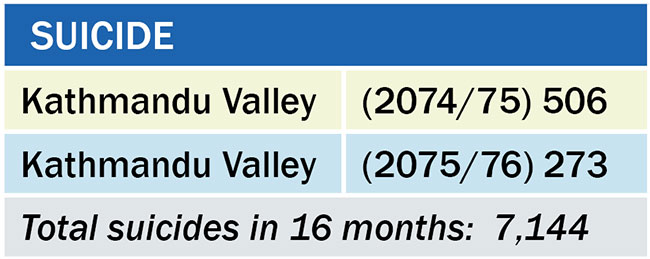KATHMANDU, March 15: At least 7,144 people committed suicide across the country, 57% of which were youth, according to Nepal Police data of the past 16 months.
Of the total suicide cases, 4,089 (57%) were committed by youths from the 16-25 and 26-35 age groups and that the latter has a higher suicide rate – 2,171. Every day, 14 people committed suicide. According to the World Health Organization, suicide is the second leading cause of death among 15-29 years old. The first cause of death s road accident.
The suicide rate is almost twice more than the registered crimes related to drugs and almost four times higher than the reported rape cases in the mentioned duration. In fiscal year 2074/75 and the first six months of 2075/76 BS, there were a total of 3,939 crimes related to drugs and 2,281 rapes.
The number, however, isn't a surprise to psychologists who cite lack of mental health awareness and stigma as major barriers to reduce suicide rates and improve mental health in the country.
454 people committed suicide in three years

Dr Umanga Jung Parakram Shah, director at the Nepal Academy of Psychology said that suicide rate is higher in the above-mentioned age groups because it is during this period that many changes – physical, emotional and social occur – changes in schools, studies, new job, competition, marriage or even higher aspirations and ambitions, among others. “These changes sometimes make youths more stressful and apprehensive.”
“Not everyone is able to cope up with the source or resolve their concerns by sharing. That population is at greater risk,” Shah said adding that one in four people suffered from mental health problems and that half of all mental illness began by the age of 14.
Karuna Kunwar, a psychologist at the Center for Mental Health and Counseling, said that when people become apprehensive and stressed, they “overthink”– thereby increasing the risks of self-inflicting damage that can also be life-threatening.
They argue that in the next decade, suicide, and mental health, at large, will be a major health issue and the World Health Organization has a bleak picture: Around 800,000 people die due to suicide every year and one person in every 40 seconds. Mental health conditions cost the world $2.5 trillion a year and could double to $6 trillion by 2030 if action is not taken against it.
 Sharing is the key
Sharing is the key
On the World Mental Health Day, October 10, 2018, the World Health Organization's slogan was “We're in this Together.” This togetherness is what Kunwar and Shah suggest to prevent suicide.
“Unlike the West, we do not share our problems,” Kunwar said. “Neither are we expressive when we have the opportunity,” she said.
Our everyday communication is an example. One of the first questions, when people meet, is 'Ke Chha' (How are you?). The question invites an opportunity to share. However, we reply in two words, “Thik Chha” (All is well).
“When we do not express, we are harming ourselves,” Shah said.
Across the world, studies have shown that confiding with a trustworthy person and seeking professional help when required can help to prevent suicide. “What's important is that your concerns, stress, anxiety or depression finds an outlet before it kills you,” Shah said.



































